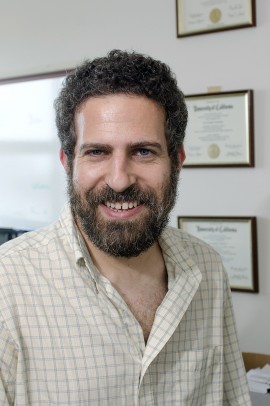For physicians, finding importance in context
The Researcher of the Year award recognizes 10 UIC scientists who are advancing knowledge in their fields. The Distinguished Researcher Award honors five researchers with a record of outstanding achievement. The Rising Star Award honors early career researchers who show promise as future leaders.

Alan Schwartz: lack of time isn’t the main reason physicians don’t pick up their cues during patient visits. Photo: Joshua Clark/UIC Photo services
Context is important — ask researchers Alan Schwartz, professor and associate head of medical education, and Saul Weiner, professor of medicine, pediatrics and medical education, and vice provost for planning and programs.
The two are studying how physicians fail to ask for, notice or act on contextual information in medical interviews with patients.
“These contextual pieces of information — the things that don’t have to do with the body, but are part of a patient’s life, like their financial situation, competing responsibilities, or even changes in family dynamics — could completely change a care plan if the doctor only knew,” said Weiner, deputy director of the UIC-affiliated VA Center of Innovation for Complex Chronic Care.
For example, if a patient’s diabetes is worsening, a doctor might prescribe a second medication to get blood glucose levels back in check. If the doctor doesn’t know that the patient can’t afford the original drug, adding another medication won’t help.
Schwartz and Weiner conducted a groundbreaking study using professional actors who posed as patients and brought hidden audio recorders to doctor visits.
Each “patient” had a scripted health issue and dropped contextual clues during the visit, like recent unemployment.
The recordings were transcribed and scored according to whether the doctors probed about the hints actors dropped, or let them go. They found that about 50 percent of the time, doctors didn’t probe for more information after a contextual clue was dropped.
In a second study, Weiner and Schwartz had real patients take hidden recorders into their visits with physicians.
They found that when the doctors asked for or picked up on contextual information, the patients were much more likely to have better health outcomes and lower health care costs over the next nine months, compared to patients whose doctors didn’t pick up on the cues.
People often think physicians fail to pick up on contextual cues because they don’t spend enough time with patients, Schwartz said.
“But we found when listening to the undercover recordings that doctors who picked up on the contextual information were able to diagnose and prescribe treatment for patients just as quickly because they didn’t keep searching for biomedical reasons for the patient’s visit that might not even exist,” Weiner said.
Schwartz and Weiner are using the protocol to help Hines VA and Jesse Brown VA medical centers physicians improve their effectiveness.
“It’s like having a mystery shopper in your store helps you see things you could do better,” Weiner said.
They are using the technique with UI Health residents doing internal medicine rotations at the Jesse Brown VA Hospital.
“Picking up on how a patient’s life circumstances impact health requires a change to thinking about patients beyond their bodies,” Weiner said.

